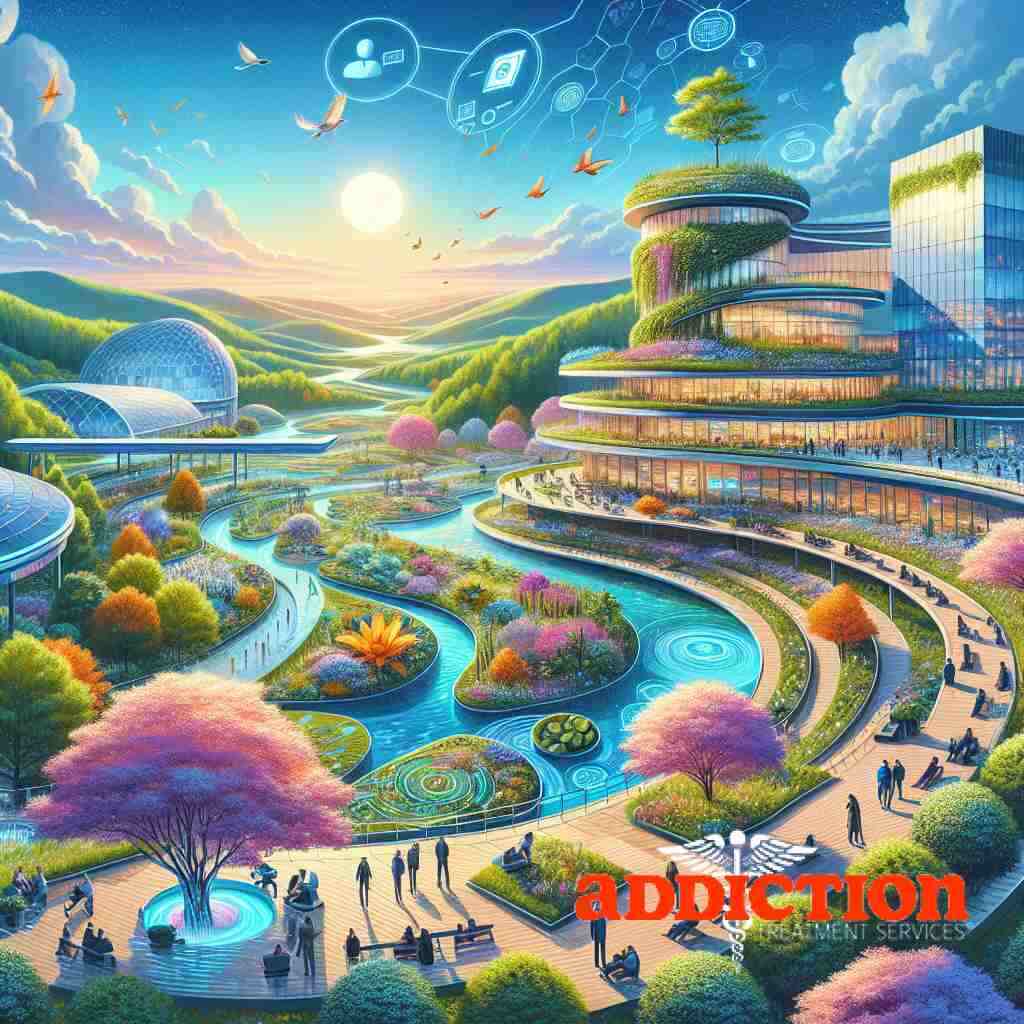 Posted On: 08/22/2023
Posted On: 08/22/2023Are you or a loved one struggling with addiction? Seeking professional help is a crucial step towards recovery. With a multitude of addiction treatment services available, finding the right one can be overwhelming. Fortunately, Addiction Treatment Services is here to guide you through the process. Our online directory provides a comprehensive list of local addiction treatment services tailored to your needs. In this blog post, we will explore the different types of addiction treatment, the importance of local treatment, and how to find drug rehab and alcohol rehab facilities near you.
Understanding Addiction
Addiction is a complex condition that affects millions of individuals worldwide. To effectively address addiction, it’s important to have a solid understanding of its nature and underlying factors.
Substance Use Disorder: Background
Substance use disorder, commonly known as addiction, is a chronic condition characterized by compulsive drug or alcohol use despite negative consequences. It affects the brain’s reward system, leading to intense cravings and a loss of control over substance use. Understanding the signs and symptoms of substance use disorder is crucial for early intervention and treatment.
The Role of Mental Health in Addiction
Mental health and addiction often go hand in hand. Many individuals struggling with addiction also have co-occurring mental health disorders such as depression, anxiety, or post-traumatic stress disorder (PTSD). Integrated treatment approaches that address both addiction and mental health are essential for achieving lasting recovery.
The Opioid Crisis: A Case Study
The opioid crisis has emerged as a major public health concern, with devastating consequences for individuals, families, and communities. Understanding the scope of this crisis and its impact on society is crucial for effective addiction treatment and prevention efforts. By examining the opioid crisis as a case study, we can shed light on the importance of early intervention and evidence-based treatment approaches.
Recognizing the Need for Treatment
Recognizing the need for addiction treatment is the first step towards recovery. It’s important to be aware of the signs of addiction, understand the impact on family dynamics, and learn about effective intervention techniques.
Signs of Addiction
Addiction manifests in various ways, and recognizing the signs can be challenging. Common signs of addiction include changes in behavior, physical health deterioration, financial difficulties, and strained relationships. By familiarizing yourself with these signs, you can take timely action and seek professional help.
Addiction and Family: Recognizing Impact
Addiction doesn’t just affect the individual struggling with substance use; it also has a profound impact on family members. Understanding the dynamics of addiction within the family system is crucial for providing support and fostering healing. Family therapy and educational programs play a vital role in the recovery process for both the individual and their loved ones.
Intervention Techniques
Interventions are structured conversations aimed at motivating individuals struggling with addiction to seek treatment. When conducted with love, empathy, and professional guidance, interventions can be powerful tools for initiating the recovery process. By learning about different intervention techniques and seeking professional advice, families can increase the chances of their loved ones accepting help.
Types of Addiction Treatment Services
Addiction treatment services encompass a wide range of approaches tailored to individual needs. Understanding the different options available can help you make informed decisions about your recovery journey.
Inpatient Rehab
Inpatient rehab, also known as residential treatment, provides a structured and supportive environment for individuals to focus on their recovery. This intensive form of treatment typically involves a stay at a residential facility where individuals receive round-the-clock care, therapy sessions, and support from a multidisciplinary team. Inpatient rehab is often recommended for individuals with severe addiction or those who require a higher level of care.
Outpatient Rehab
Outpatient rehab offers flexibility for individuals who cannot commit to a residential program due to work, family, or other obligations. It provides comprehensive addiction treatment services while allowing individuals to live at home and maintain their daily routines. Outpatient rehab typically includes individual counseling, group therapy, educational programs, and access to community support networks. It is suitable for individuals with milder addiction or those transitioning from inpatient rehab.
Medication-Assisted Treatment
Medication-assisted treatment (MAT) combines medication, such as methadone, buprenorphine, or naltrexone, with behavioral therapies to treat opioid addiction. MAT helps alleviate withdrawal symptoms, reduce cravings, and stabilize brain chemistry. This evidence-based approach is highly effective in improving treatment outcomes and reducing the risk of relapse. Addiction Treatment Services directory can help you find local clinics and providers offering MAT services.
Dual Diagnosis Treatment
Dual diagnosis treatment addresses co-occurring substance use and mental health disorders. It recognizes the interplay between addiction and mental health and provides integrated treatment to address both conditions simultaneously. Dual diagnosis treatment typically involves a combination of therapies, medication management, and ongoing support to promote recovery and enhance overall well-being. Finding specialized dual diagnosis treatment centers through Addiction Treatment Services directory ensures you receive comprehensive care for your specific needs.
Exploring Local Addiction Treatment Services
When seeking addiction treatment, choosing local services offers several advantages. Accessibility, ongoing support, and the ability to involve your loved ones in your recovery journey are just a few of the benefits.
Importance of Local Treatment
Local treatment allows you to access addiction services conveniently, minimizing logistical challenges and reducing barriers to treatment. It also provides opportunities for ongoing support and follow-up care, critical components of long-term recovery. Additionally, local treatment allows you to involve your family and loved ones, fostering a supportive environment that enhances your chances of success.
Finding Drug Rehab and Alcohol Rehab Facilities Near You
Addiction Treatment Services offers an online directory that allows you to find drug rehab and alcohol rehab facilities near you. By simply entering your location, you can access a comprehensive list of local treatment providers. The directory provides detailed information about each facility, including the types of services offered, treatment approaches, and contact information. This valuable resource empowers you to make informed decisions about your treatment options.
Understanding Local Detox Centers
Detoxification, or detox, is often the first step in addiction treatment. Local detox centers provide a safe and supervised environment for individuals to undergo the withdrawal process. Detox services aim to manage withdrawal symptoms, ensure medical stability, and prepare individuals for further treatment. Understanding the role of local detox centers and their connection to addiction treatment services is essential for a comprehensive recovery plan.
Delving Deeper into Rehabilitation Programs
Rehabilitation programs play a pivotal role in the recovery process by providing structured support and comprehensive treatment. Let’s explore different types of rehabilitation programs and help you make an informed choice.
12-Step Programs and Their Role in Recovery
12-Step programs, such as Alcoholics Anonymous (AA) and Narcotics Anonymous (NA), have helped millions of individuals achieve and maintain sobriety. These programs follow a spiritual approach and provide a supportive community of individuals facing similar challenges. The 12-Step philosophy encourages self-reflection, acceptance, and personal accountability, serving as a strong foundation for long-term recovery.
Holistic Addiction Treatment
Holistic addiction treatment takes a comprehensive approach to address the physical, emotional, and spiritual aspects of addiction. It integrates various therapeutic modalities, including yoga, meditation, art therapy, and mindfulness practices, to promote overall well-being. Holistic treatment recognizes the interconnectedness of mind, body, and spirit and aims to restore balance and harmony in one’s life. Incorporating holistic practices into your recovery journey can enhance the effectiveness of traditional treatment methods.
Residential vs. Outpatient Rehab: Making a Choice
When considering rehabilitation options, it’s essential to understand the differences between residential and outpatient rehab programs. Residential rehab provides a structured and immersive environment where individuals reside at the facility for the duration of their treatment. It offers round-the-clock support, intensive therapy, and a break from external triggers.
On the other hand, outpatient rehab allows individuals to live at home and attend scheduled therapy sessions and treatment activities. It provides flexibility for those with work or family commitments. Choosing between residential and outpatient rehab depends on the severity of addiction, personal circumstances, and treatment goals.
Effective Therapies in Addiction Treatment
Therapy plays a central role in addiction treatment, addressing the underlying causes and providing individuals with the necessary tools for sustainable recovery. Let’s explore two essential types of therapy: individual therapy and group therapy, as well as the significance of family support.
Individual Therapy in Addiction
Individual therapy, conducted one-on-one with a trained therapist, allows individuals to explore their thoughts, emotions, and behaviors related to addiction in a confidential setting. Therapists employ various evidence-based approaches, such as cognitive-behavioral therapy (CBT) and motivational interviewing, to help individuals gain insight, develop coping skills, and work towards lasting change. Individual therapy provides personalized attention and focuses on addressing specific challenges and goals throughout the recovery journey.
Group Therapy: The Power of Community
Group therapy brings individuals together in a supportive and non-judgmental environment, allowing them to share their experiences, challenges, and successes. Group therapy fosters a sense of belonging and provides a platform for individuals to develop interpersonal skills, gain peer support, and learn from others who have faced similar struggles. It promotes empathy, accountability, and a collective sense of growth. Group therapy can be particularly beneficial during and after residential or outpatient rehab programs.
Family Support in Addiction Recovery
Family support plays a vital role in addiction recovery. Family therapy and education programs offer a platform for open communication, healing, and rebuilding trust within the family system. Families can learn about addiction, set healthy boundaries, and develop strategies to support their loved ones in recovery. Involving family members in the treatment process increases the likelihood of successful outcomes and provides a strong support system for sustained sobriety. Addiction Treatment Services can help you find local resources for family support and therapy.
Preventing Relapse: A Critical Part of Recovery
Preventing relapse is an essential aspect of maintaining long-term sobriety. Let’s explore the importance of addiction recovery support and the role of sober living in preventing relapse.
Addiction Recovery Support: Aftercare Services
Aftercare services are crucial in providing ongoing support and guidance after completing a formal addiction treatment program. These services can include individual counseling, support groups, continued therapy sessions, and access to community resources. Aftercare helps individuals navigate the challenges of early recovery, cope with triggers and cravings, and build a strong support network. Addiction Treatment Services can assist you in finding local aftercare services tailored to your specific needs.
Sober Living and Relapse Prevention
Sober living homes provide a transitional living environment for individuals in early recovery. These homes offer a structured and supportive setting where residents can practice sobriety skills, maintain accountability, and develop a healthy routine. Sober living homes often have specific rules, such as mandatory attendance at support group meetings and regular drug testing, to promote a drug-free and supportive atmosphere. By residing in a sober living home, individuals can gradually transition back into independent living while receiving ongoing support and guidance.
Addiction Treatment Resources
Accessing the right addiction treatment resources is essential for effective recovery. Let’s explore local mental health services, addiction helplines, and the use of online resources for addiction help.
Local Mental Health Services
Addressing mental health concerns alongside addiction is crucial for comprehensive treatment. Local mental health services offer a range of therapeutic interventions, counseling, psychiatric support, and medication management for individuals with co-occurring mental health and substance use disorders. Collaborating with mental health professionals can help address underlying emotional issues and promote overall well-being. Addiction Treatment Services can connect you with local mental health resources to support your recovery journey.
Addiction Helplines and Resources
Addiction helplines are invaluable resources for individuals seeking immediate assistance, information, and support. Helpline operators are trained professionals who can provide guidance, answer questions, and connect individuals with local treatment options and resources. Additionally, various online platforms offer comprehensive information, educational materials, and support forums for individuals affected by addiction. Utilizing addiction helplines and online resources can empower you to take the first steps towards recovery.
Using Online Resources for Addiction Help
Online resources have become increasingly important in accessing addiction help and support. Websites, blogs, and forums provide a wealth of information on addiction, recovery strategies, and personal stories. Online therapy platforms offer virtual counseling sessions, making professional help more accessible, especially for those in remote areas or with limited mobility.
Social media platforms and smartphone applications also offer a range of addiction recovery tools, including sobriety trackers, meditation apps, and support group communities. It’s important to use reliable and evidence-based online resources to ensure accurate information and support. Addiction Treatment Services can guide you towards reputable online resources for addiction help.
Navigating Insurance and Cost for Addiction Treatment
Accessing addiction treatment services can raise concerns about insurance coverage and affordability. Let’s explore how to navigate insurance coverage for rehab services and manage the cost of treatment without insurance.
Understanding Insurance Coverage for Rehab Services
Insurance coverage for addiction treatment varies depending on the individual insurance plan and provider. It’s important to review your insurance policy or contact your insurance company directly to understand the extent of coverage for rehab services. Some insurance plans may cover a portion or all of the costs associated with detoxification, inpatient rehab, outpatient rehab, and medication-assisted treatment.
Additionally, they may have specific network providers and treatment facilities that offer higher coverage rates. Understanding your insurance coverage can help you make informed decisions about treatment options and financial planning. Addiction Treatment Services can assist you in finding treatment providers that accept your insurance and maximize your coverage.
Managing Cost of Treatment without Insurance
For individuals without insurance coverage for addiction treatment, there are still options available to manage the cost. Here are some strategies to consider:
- Sliding Scale or Income-Based Programs: Many treatment facilities offer sliding scale payment options or income-based programs, where the cost of treatment is adjusted based on your income and financial situation. These programs can help make treatment more affordable and accessible.
- Scholarships and Grants: Some treatment centers and nonprofit organizations provide scholarships or grants to individuals who demonstrate financial need. These financial assistance programs can significantly reduce the cost of treatment or cover it entirely.
- Payment Plans: Speak with the treatment facility about setting up a payment plan. This allows you to divide the cost of treatment into manageable monthly payments, making it easier to budget and afford.
- State and Local Resources: Check with your state or local government for available resources and programs that provide addiction treatment services at reduced or no cost. These resources may include community health clinics, state-funded rehab centers, or government-sponsored initiatives to address substance abuse.
Embracing Recovery: Life Beyond Addiction
Recovery from addiction opens the door to a fulfilling and healthy life. Let’s explore personal stories of drug and alcohol addiction recovery, the role of sobriety resources in long-term recovery, and celebrating success in maintaining a sober lifestyle.
Personal Stories: Drug and Alcohol Addiction Recovery
Personal stories of addiction recovery offer hope, inspiration, and relatability to individuals who are on their own recovery journey. Hearing about others’ experiences, challenges, and triumphs can provide encouragement and remind you that recovery is possible. Many individuals share their stories through memoirs, support group meetings, online platforms, and recovery-focused events. These personal accounts serve as powerful reminders of the resilience and strength that can be found within each person’s journey to sobriety.
The Role of Sobriety Resources in Long-Term Recovery
Sobriety resources play a crucial role in supporting long-term recovery. These resources encompass a wide range of tools, strategies, and support networks that can help individuals maintain sobriety and navigate the challenges of daily life. Some common sobriety resources include support group meetings like AA or NA, sober social events, sober living communities, online recovery communities, sober coaching, and ongoing therapy or counseling. Engaging with sobriety resources provides a sense of connection, accountability, and ongoing growth, which are vital elements in sustaining recovery.
Celebrating Success: Maintaining a Sober Lifestyle
Maintaining a sober lifestyle is an ongoing journey that requires dedication, self-care, and celebration of milestones and successes along the way. Here are some tips for maintaining a sober lifestyle:
- Self-Care: Prioritize self-care activities that support your physical, emotional, and mental well-being. This can include regular exercise, healthy eating, getting enough sleep, practicing relaxation techniques, and engaging in hobbies or activities that bring you joy.
- Support Network: Surround yourself with a supportive network of friends, family, and peers who understand and respect your commitment to sobriety. Attend support group meetings or engage with sober communities to connect with others who are also on the path of recovery.
- Healthy Coping Mechanisms: Develop healthy coping mechanisms to deal with stress, triggers, and cravings. This can include practicing mindfulness, journaling, seeking therapy or counseling, engaging in creative outlets, or participating in activities that promote relaxation and emotional well-being.
- Avoiding Triggers: Identify and avoid triggers that may jeopardize your sobriety. This can involve steering clear of certain environments, individuals, or situations that could potentially lead to relapse. Learning to recognize and manage triggers is an essential skill in maintaining long-term sobriety.
- Setting Goals: Set realistic and meaningful goals for yourself, both in your recovery journey and in other areas of life. Working towards and achieving these goals provides a sense of purpose, motivation, and fulfillment.
- Celebrate Milestones: Celebrate your accomplishments and milestones along the way. Whether it’s marking a month, a year, or several years of sobriety, acknowledging your progress reinforces your commitment and reminds you of how far you’ve come.
Conclusion
Seeking help for addiction is a courageous and transformative decision. Understanding addiction, recognizing the need for treatment, exploring local addiction treatment services, and embracing effective therapies are crucial steps towards recovery. Addiction Treatment Services is committed to assisting individuals in finding the local addiction treatment services they need through their comprehensive online directory.
By leveraging Addiction Treatment Services, individuals can access a wide range of addiction treatment options, including inpatient and outpatient rehab, medication-assisted treatment, and dual diagnosis programs. The directory also provides valuable resources for finding local detox centers and understanding the importance of local treatment.
Recovery from addiction is not just about getting sober; it’s about embracing a new way of life. Personal stories of addiction recovery, the role of sobriety resources, and celebrating milestones contribute to long-term recovery success. By engaging in self-care, building a strong support network, developing healthy coping mechanisms, and setting meaningful goals, individuals can maintain a sober lifestyle and thrive in their journey of recovery.
Remember, reaching out for help is a sign of strength, and you don’t have to face addiction alone. If you or someone you know is struggling with addiction, don’t hesitate to reach out to Addiction Treatment Services and take the first step towards a healthier, happier, and sober life.


